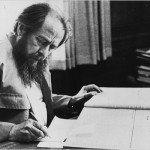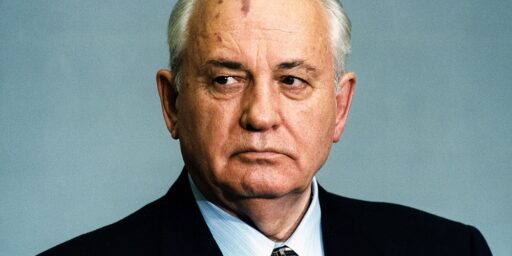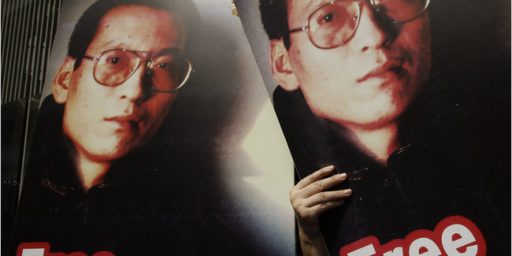Alexander Solzhenitsyn Dead at 89
Alexander Solzhenitsyn, the Nobel laureate whose Gulag Archipelago trilogy made him perhaps the most visible Soviet dissident, has died from heart disease at the age of 89.
CNN: “Russian novelist, former dissident, Solzhenitsyn dead”
Awarded the Nobel Prize for literature in 1970 for “The First Circle,” Alexander Solzhenitsyn was considered a moral voice for Russia. His works centered on issues of good and evil, materialism and salvation. His three-volume “Gulag Archipelago” unveiled the horrors of the Soviet labor camps, where he himself was imprisoned for eight years.
[…]
He was arrested in February 1945 for writing letters critical of Stalin and was sentenced to eight years at labor camps, which would provide the context of his future writings.
“During all the years until 1961, not only was I convinced that I should never see a single line of mine in print in my lifetime, but, also, I scarcely dared allow any of my close acquaintances to read anything I had written because I feared that this would become known,” he said in the Nobel autobiography. “Finally, at the age of 42, this secret authorship began to wear me down.”
He published his first work, a novella titled “One Day in the Life of Ivan Denisovich,” in a literary journal in 1959. The story was based on his own experiences at a labor camp in Kazakhstan where he worked as a miner, bricklayer and foundryman, and was later printed on a wider scale in 1961.
After publishing several more works, including the novel “Cancer Ward” — a fictional piece based on Solzhenitsyn’s own successful treatment at a clinic in Uzbekistan during his post-labor camp years of exile from 1953 to June 1956 — he won the Nobel Prize for “The First Circle.” However, Solzhenitsyn didn’t attend the ceremony for fear he would not be allowed re-entry into the Soviet Union. Three years later, his “Gulag Archipelago” was published in Paris, France.
In 1974, he was accused of treason, stripped of his citizenship and deported to West Germany. He accepted an invitation to teach at Stanford University in California, then later moved to the woods of Cavendish, Vermont, where he lived with his family for years.
In 1990, his citizenship was restored, and he moved back to Russia in 1994.
 A long NYT obit, “Solzhenitsyn, Literary Giant Who Defied Soviets, Dies at 89,” notes that, “Mr. Solzhenitsyn outlived by nearly 17 years the Soviet state and system he had battled through years of imprisonment, ostracism and exile.”
A long NYT obit, “Solzhenitsyn, Literary Giant Who Defied Soviets, Dies at 89,” notes that, “Mr. Solzhenitsyn outlived by nearly 17 years the Soviet state and system he had battled through years of imprisonment, ostracism and exile.”
Volokh Conspirator Ilya Somin notes that, despite his anti-Soviet stance, Solzhenitsyn was no Jeffersonian:
Unlike fellow dissidents such as Andrei Sakharov, Solzhenitsyn was a Russian nationalist, not a liberal democrat. As such, he was suspicious of Western-style democracy and individual rights. While he was not as much of a chauvinist as some other Russian nationalists, his writings defending czarist Russia and Russian culture sometimes verged into anti-Semitism. For example in one of his last books, Two Hundred Years Together, Solzhenitsyn made the absurd claim that the czarist-era Russian government was not anti-Semitic and that Russian Jews bear as much or more blame than Russian gentiles do for the historic conflicts between the two groups. As Cathy Young has pointed out, in view of the czarist state’s “systematic oppression and violence” against the Jews, this is “a bit like asking blacks to accept their share of blame for Jim Crow.” Solzhenitsyn’s nationalism also led him to endorse some of Vladimir Putin’s authoritarian measures, and to oppose allowing Ukraine to become independent of Russia after the fall of the Soviet Union (he did, to his credit, support independence for all the non-Slavic parts of the former Soviet empire, which he did not consider to be legitimate Russian possessions).
Quite right. Solzhenitsyn was a great man who will rightly be long remembered for his literary work and stand against the Soviets but he was no saint.
UPDATE: Nick Gvosdev expands on this point nicely:
[A] critic of a totalitarian system is not ipso facto a supporter of American-style liberalism. Nor, in seeking to destroy the old system, will such a person automatically endorse everything that the successor regime does. Solzhenitsyn was a bold and prophetic critic to the evils of the Soviet system; he was horrified by what occurred in post-Soviet, 1990’s “free” Russia.
Solzhenitsyn’s trajectory is important to keep in mind as we expect and wait for Iranian and Chinese versions; critics of their own systems will not mean that they uncritically endorse us.
There’s a tendency, reinforced by our media and politicians, to view foreigners through a US lens. Foreign leaders are either “pro-American” or “anti-American.” Mostly, as with Solzhenitsyn, they’re just human beings with their own interests, biases, and concerns.






It strikes me as annoying that the “Paper of Walter Duranty’s Record” said nothing in those eight pages about the apoligist role they played for the Soviets that Solzhenitsyn spent his life fighting.
I think it’s fair to say that he thought the Enlightenment was an error, and that the West has compounded the error in the intervening centuries to present. He was no fan of liberal democracy as we know it in the West. One ought really to read his Harvard address
Yep, Bits. It’s certainly as annoying that the NY Times didn’t mention what they said about the USSR 70 years ago as it is that National Review doesn’t utter a peep nowadays about its energetic opposition to voting rights for southern blacks as late as 1964 (or the W.H. von Dreele poems they were printing as late as 1978 comparing Martin Luther King to Father Divine and announcing that Earl Warren deserved to go to Hell for the “Brown” decision).
Non-ideological footnote: Solzhenitsyn is hardly the only extremely important major 20th century world figure who was on balance a genuine hero, but who had a serious case of clay feet. Consider Winston Churchill’s rabid, inexplicable, and literally genocidal hatred of Indians (“I hate them. They are a beastly people with a beastly religion.”) When Lord Mountbatten sent him a telegram in 1942 saying that there was a famine in the country and pleading for help, Churchill’s only response was to send a telegram asking why Gandhi hadn’t starved to death yet. (The entire world may yet end up paying for WC’s prejudices in this direction, since it was at his insistence that Britain worked to encourage Pakistan to split away from India.)